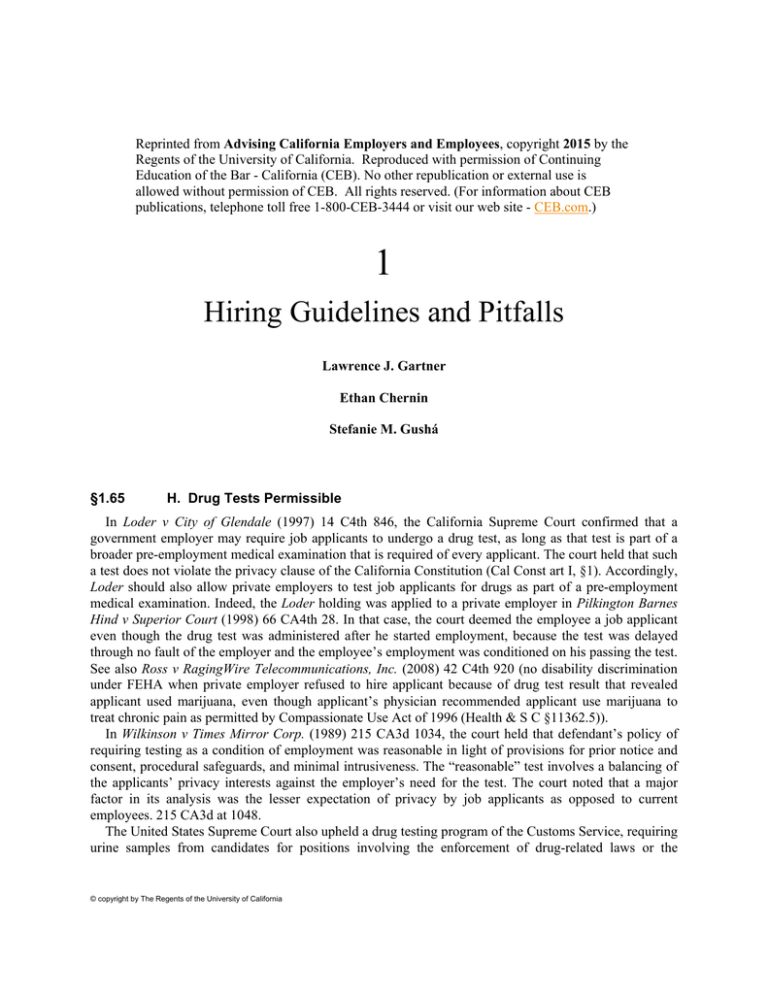
Reprinted from Advising California Employers and Employees, copyright 2015 by the
Regents of the University of California. Reproduced with permission of Continuing
Education of the Bar - California (CEB). No other republication or external use is
allowed without permission of CEB. All rights reserved. (For information about CEB
publications, telephone toll free 1-800-CEB-3444 or visit our web site - CEB.com.)
1
Hiring Guidelines and Pitfalls
Lawrence J. Gartner
Ethan Chernin
Stefanie M. Gushá
§1.65
H. Drug Tests Permissible
In Loder v City of Glendale (1997) 14 C4th 846, the California Supreme Court confirmed that a
government employer may require job applicants to undergo a drug test, as long as that test is part of a
broader pre-employment medical examination that is required of every applicant. The court held that such
a test does not violate the privacy clause of the California Constitution (Cal Const art I, §1). Accordingly,
Loder should also allow private employers to test job applicants for drugs as part of a pre-employment
medical examination. Indeed, the Loder holding was applied to a private employer in Pilkington Barnes
Hind v Superior Court (1998) 66 CA4th 28. In that case, the court deemed the employee a job applicant
even though the drug test was administered after he started employment, because the test was delayed
through no fault of the employer and the employee’s employment was conditioned on his passing the test.
See also Ross v RagingWire Telecommunications, Inc. (2008) 42 C4th 920 (no disability discrimination
under FEHA when private employer refused to hire applicant because of drug test result that revealed
applicant used marijuana, even though applicant’s physician recommended applicant use marijuana to
treat chronic pain as permitted by Compassionate Use Act of 1996 (Health & S C §11362.5)).
In Wilkinson v Times Mirror Corp. (1989) 215 CA3d 1034, the court held that defendant’s policy of
requiring testing as a condition of employment was reasonable in light of provisions for prior notice and
consent, procedural safeguards, and minimal intrusiveness. The “reasonable” test involves a balancing of
the applicants’ privacy interests against the employer’s need for the test. The court noted that a major
factor in its analysis was the lesser expectation of privacy by job applicants as opposed to current
employees. 215 CA3d at 1048.
The United States Supreme Court also upheld a drug testing program of the Customs Service, requiring
urine samples from candidates for positions involving the enforcement of drug-related laws or the
© copyright by The Regents of the University of California
2
Hiring Guidelines and Pitfalls
§1.65
carrying of firearms. National Treasury Employees Union v Von Raab (1989) 489 US 656, 109 S Ct
1384.
NOTE► Unlike medical testing, testing for illegal use of drugs is not subject to restrictions under the
ADA. 42 USC §12114(d).
No matter how carefully an employer has crafted its drug testing policy, challenges can be expected
unless the intrusiveness of test-taking procedures is minimized. For example, the employer should not
require a test subject to provide a urine sample while under direct supervision. See Hansen v California
Dep’t of Corrections (ND Cal 1996) 920 F Supp 1480 (urine test under direct observation violates
California Constitution’s right to privacy); Tucker v Dickey (WD Wis 1985) 613 F Supp 1124, 1129
(manner of conducting urine test unreasonable under Fourth Amendment).
The most likely claim arising from a drug test is one alleging that the applicant or employee was the
victim of an unconstitutional search or of invasion of privacy. Other potential claims that may be asserted
against an employer for wrongful testing include intentional infliction of emotional distress, defamation,
violation of the ADA if the employee is a recovering abuser, and wrongful termination if the employee is
discharged as a result of the test.
The potential for inaccuracies in the testing process, combined with the potential harm that may result
from allegations of substance abuse, make these issues of particular concern. Because drug screening tests
may be challenged as unreliable, a second confirming test should be conducted when a sample shows the
presence of drugs.
To help defend against employee claims, employers should obtain written consent before testing for
drugs. Although a consent may be challenged as obtained under duress, it provides the employer with at
least some evidence that it had the employee’s approval. Also, a consent can specify the consequences to
the employee if he or she does not consent.
For further discussion of drug testing issues, see §§13.59–13.69.
For further discussion, see Advising California Employers and Employees: Hiring
Guidelines and Pitfalls, chapter 1 (Cal CEB). Available in print and through OnLaw.
Be ready to deal with virtually any workplace issue your clients may face. Amongst the
many topics discussed in this manual:
• Hiring guidelines and employment contracts
• Wages and hours; family and medical leave
• Employee handbooks
• Privacy issues in the workplace
• Wrongful termination; reductions in force
© copyright by The Regents of the University of California
